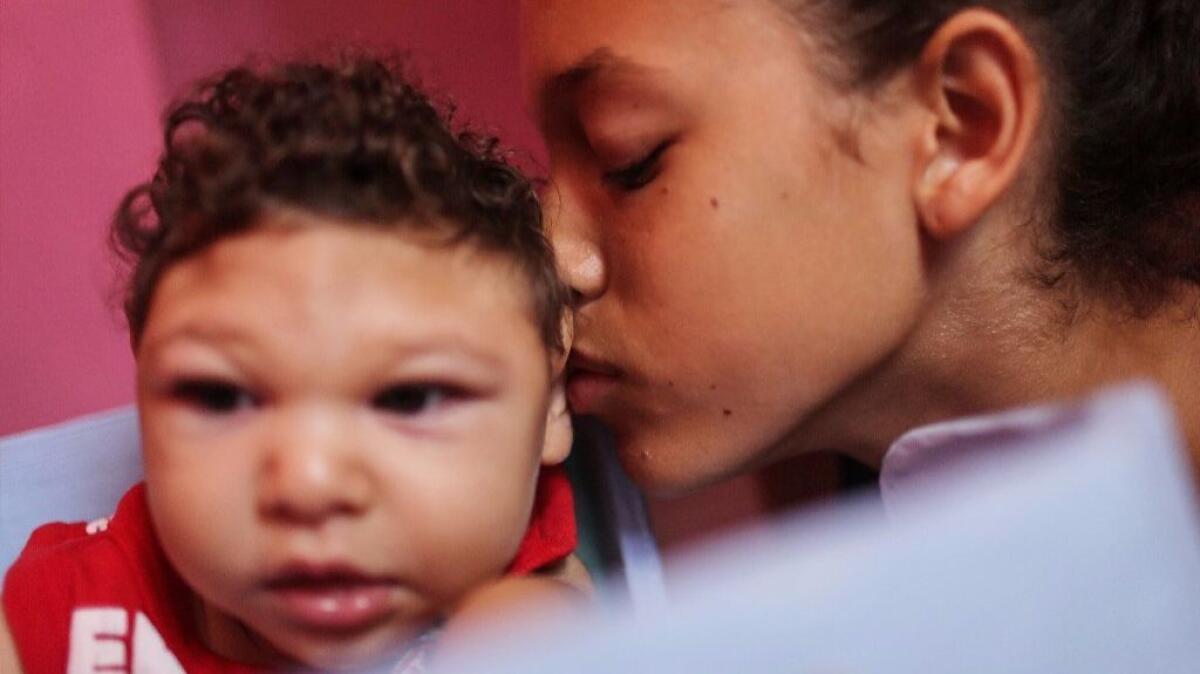New Zika findings reveal how virus does its damage, and two weapons that might help fight it

- Share via
In the blood of a patient infected with Zika, researchers have found key proteins that could help them create medicines and vaccines to fight the rapidly spreading virus.
A study published Wednesday in the journal Science Translational Medicine describes two antibodies that were able to “eliminate” samples of the Zika virus when tested in laboratory dishes. When the researchers gave either of the antibodies to mice that had been deliberately infected with Zika, the animals “were completely protected against ZIKV infection,” according to the study.
Importantly, the antibodies did not seem to recognize strains of Dengue virus, a close relative of Zika. If these antibodies are developed into medicines, that feature could reduce the risk of inadvertently fueling the rise of a more dangerous strain of Dengue, the researchers noted.
The antibodies were harvested from the blood of a patient in China who became ill in Venezuela.
The report is the latest in a spate of research describing the inner workings of the Zika virus and the ways it does damage to pregnant women and their developing babies.
In Wednesday’s edition of the New England Journal of Medicine, Brazilian public health officials reported the results of one of the first studies to systematically test women for Zika throughout their pregnancies and track the health of their babies.
Working with UCLA pediatric infectious disease specialist Dr. Karin Nielsen-Saines, the Brazilians followed a group of 345 women throughout their pregnancies. Among them, 53% tested positive for Zika.
The researchers examined the infants born to infected women and found that 46% of the babies had health problems, compared with 11% of the babies born to uninfected mothers. Among affected infants, 42% had “grossly abnormal clinical or brain imaging findings,” including some who had both. In addition, four of the infants were diagnosed with microcephaly.
While researchers have long suspected that Zika infections early in pregnancy were most harmful to developing fetuses, the Brazilian study found that the trimester during which the women were infected did not matter much.
Some 55% of pregnant women infected in their first trimester had poor pregnancy outcomes, as did 52% of those infected in their second trimester and 29% of those infected in their third trimester. These outcomes ranged from a baby’s small overall size — a result of fetal growth restriction — to fetal distress during birth.
Abnormalities of the central nervous system were seen in fetuses infected as late as 39 weeks of gestation, the researchers said.
A study that tracked Zika-infected pregnant women in the United States, meanwhile, offered more specific numbers on microcephaly and suggested that Zika infection early in pregnancy does pose the greatest risk.
In an article in Wednesday’s edition of the journal JAMA, researchers found that 6% of Zika-infected pregnant women in the United States had a fetus or infant with evidence of a Zika-related birth defect. All of these women were infected during their first trimester, the study found. Among this group, 11% had a fetus or infant with a birth defect.
Infants with microcephaly represented 4% of the 442 completed pregnancies that were tracked.
Meanwhile, a report from the Centers for Disease Control and Prevention offers more fine-grained detail of Zika’s harm. It confirms the virus’ powerful attraction to the placenta and to developing brain tissue and shows that long after a pregnant woman has recovered from Zika infection’s mild symptoms, the virus is thriving inside placental tissue and a fetus’ developing brain.
The study, published online Tuesday in the journal Emerging Infectious Disease, is the first to show Zika’s genetic material replicating in brain tissues of infants with microcephaly who later died, and in placentas of women who suffered pregnancy losses.
Zika can continue to replicate in infants’ brains even after birth, said study lead author Julu Bhatnagar, who leads the molecular pathology team at the CDC’s Infectious Diseases Pathology Branch. The virus’ persistence suggests that even apparently healthy babies born to mothers who were infected with Zika may not be out of the woods, and that babies born with microcephaly may experience ongoing brain damage from their mothers’ Zika infection.
“We don’t know how long the virus can persist,” Bhatnagar said. “More studies are needed to fully understand how the virus can affect babies.”
Follow me on Twitter @LATMelissaHealy and “like” Los Angeles Times Science & Health on Facebook.
MORE IN SCIENCE
Teens are cutting back on drugs, alcohol, smoking and even electronic cigarettes, study finds
Optimistic women are less likely to die prematurely of cancer or heart disease, study says
Sorry, Pokemon Go addicts, playing the video game doesn’t count as a real workout







